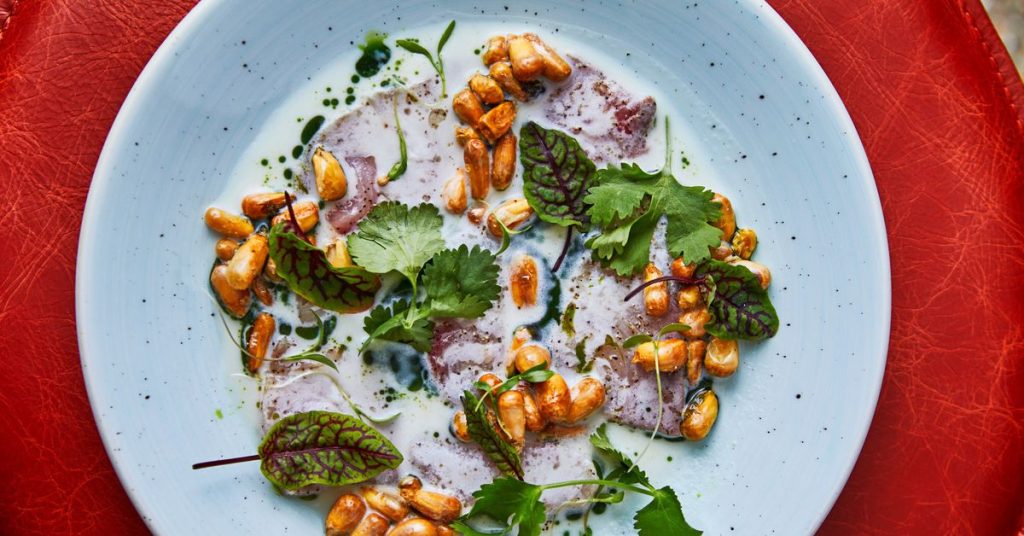Houston Top Chef contender Tristen Epps has plans to educate diners about the Transatlantic Slave Trade and its lasting social, cultural, and economic impacts in a pop-up dining experience. In honor of Black History Month this February, the James Beard semifinalist and Marcus Samuelsson protege is launching a three-part tasting menu at Heights restaurant Jūn, which also gives a glimpse of his anticipated Afro-Caribbean restaurant, Buboy (pronounced bUH-boy). “I want to make sure that this story behind this cuisine is told,” he says. “Black food is American food. Black history is American history, and I want that to be really shown and in ways as best as I can.”
Epps says the dining series will offer an omakase-like, experiential meal but in a “Black way,” with vibrant Afro-Caribbean flavors centered in a fine-dining setting; the goal is to make it a safe space that celebrates Black joy and resilience but is accessible to anyone. “[People from other cultures] can come to be introduced to our cuisine, which has had a big impact on American cuisine,” Epps says, adding that he’ll also punch up familiar dishes like oxtail and gumbo with luxe ingredients like caviar, foie gras, king crab, and truffles.
The pop-up series, which Epps has offered for more than six years in other cities, including New York, Denver, and Miami, illustrates the chef’s journey through kitchens around the world and his own examination of his culinary heritage. But this year’s Houston debut is a little different: The pop-up comes ahead of the opening of his first Houston restaurant and, in many ways, serves as a preview of what’s to come. Named after his grandfather’s nickname, Buboy strives to make Black foodways more mainstream. Epps says that just as French and Italian cuisines are dynamic in that they have “peasant food” and more elegant, storied presentations, Epps wants to see the same for Black diasporic cuisines. “I want to do nothing but build value on [its past] while celebrating what it is now,” he says.
:no_upscale()/cdn.vox-cdn.com/uploads/chorus_asset/file/25862292/IMG_0462.jpg)
The pop-up series, which launches on Tuesday, February 11, will spend three weeks focusing on the Transatlantic slave route — exploring Black culture, ingredients, and culinary techniques that have shaped foodways around the world. In its first week, six courses will illustrate West African foodways, with dishes like grilled oyster with rundown stew and crispy provision; Dasheen Dumplin’ with groundnut stew and local sheep’s milk cheese; Texas wagyu with smoked peanut suya and grilled gai lan (Chinese broccoli); and grilled Gulf fish with plantain pudding and oxtail spinach stew. Epps dives deeper into the Caribbean during the second week with stew chicken made with Texas quail, truffle rice and peas with burnt sugar quail jus, and foie gras served with curried duck. The series culminates in the Americas, starting with Central American dishes like Epps’s rendition of Mexican peanut stew with chicken and roti, and then through the Deep South of the United States, where dishes like perloo, which takes its foundation from Carolina gold rice, was a staple in the Gullah Geechee community in the Carolinas.
When slavery ended and various U.S. industries could no longer rely on free labor, the chef says, the United States’s rice industry changed entirely. “That’s what America’s wealth was built on,” he says of the complex history around rice in the Carolinas. “[My dish is] a way to re-celebrate the people who cultivated the land.” Diners can also taste an expansive take on gumbo made with ingredients such as king crab and homemade duck sausage.
The Virginia native says his love for food was codified by his time spent living abroad with his family and Black Trinidadian mother, who was in the military. As a child — while his mother was stationed and working in Japan — Epps says he would watch the cooking channel and QVC (the only channels that were in English) and experiment in the kitchen. Scrambled eggs were the gateway. “I thought it was the most amazing thing that eggs can go from a shell to this vicious orb and that you could turn it into something really delicious,” he says. “That alchemy blew my mind.”
:no_upscale()/cdn.vox-cdn.com/uploads/chorus_asset/file/25851792/Tristen_NUP_205385_03542.jpg)
Family and friends took notice of his deep interest in cooking and further encouraged him by gifting him cookbooks and other tomes about food. As he traveled from country to country with his family, Epps says he became more attuned to how cultural foodways could be different but have many similar threads tying them together. He enrolled in culinary school at Johnson & Wales University’s Charlotte campus and later did a three-year apprenticeship at the Greenbrier Hotel in West Virginia. In 2014, he decided it was time to move on. “I was craving a large city with some diversity, and I looked for the biggest city I could find that wasn’t New York,” he says. He couldn’t afford Los Angeles, so he moved to Houston, where he worked for the Four Seasons Hotel and, later, the now-closed Pass & Provisions.
All the while, Epps says, most restaurant owners hired him for his French training and seemed less interested in his flair for Caribbean flavors and cuisine. But Epps’s trajectory changed when he landed a spot on ABC’s The Taste, where celebrity chef Marcus Samuelsson became his mentor. Epps followed Samuelsson to New York, Sweden, Bermuda, and Washington, D.C, before opening his own restaurant in Brooklyn. “It was the first time I could make Caribbean food, and the chef was like, ‘Go harder,’” he says. “I learned a ton, and I found out a lot about myself.” Epps later did a short stint in Denver, where he worked for chef Tory Guard of Guard and Grace, but says he craved something else entirely. That landed him in Aspen, and then in Miami, where, while working at Samuelsson’s Red Rooster outpost in Overtown, he was named a James Beard semifinalist for the Best Chef: South category; he also helped Red Rooster earn Michelin Bib Gourmand recognition.
Epps finally returned to Houston in March 2024 to plant roots with Buboy. “Houston is such an open city for food,” Epps says, noting that each neighborhood offers a different cultural experience, with the city being home to large Black, Vietnamese, and Latin diasporic communities. “I love that I can touch all of those people at the same time [with my food], and no one is necessarily scoffing at it.”
Buboy doesn’t have a home yet. Epps says he’s still looking for a space where he can be in the middle of the dining room or a bar to deliver a story and food straight to the plate. “Someone needs to be there to say what these dishes are and what they mean to our country, our history — all of it,” he says, “And that history needs to be told until it’s just a normal thing.”
:no_upscale()/cdn.vox-cdn.com/uploads/chorus_asset/file/25862294/p__3_.jpeg)
Epps’s Black History Month pop-up series offers two seatings each night for $95 per person, with an option of a $45 wine pairing. Dates are Tuesday, February 11; Tuesday, February 18; and Tuesday, February 25. Diners can make reservations on OpenTable.








